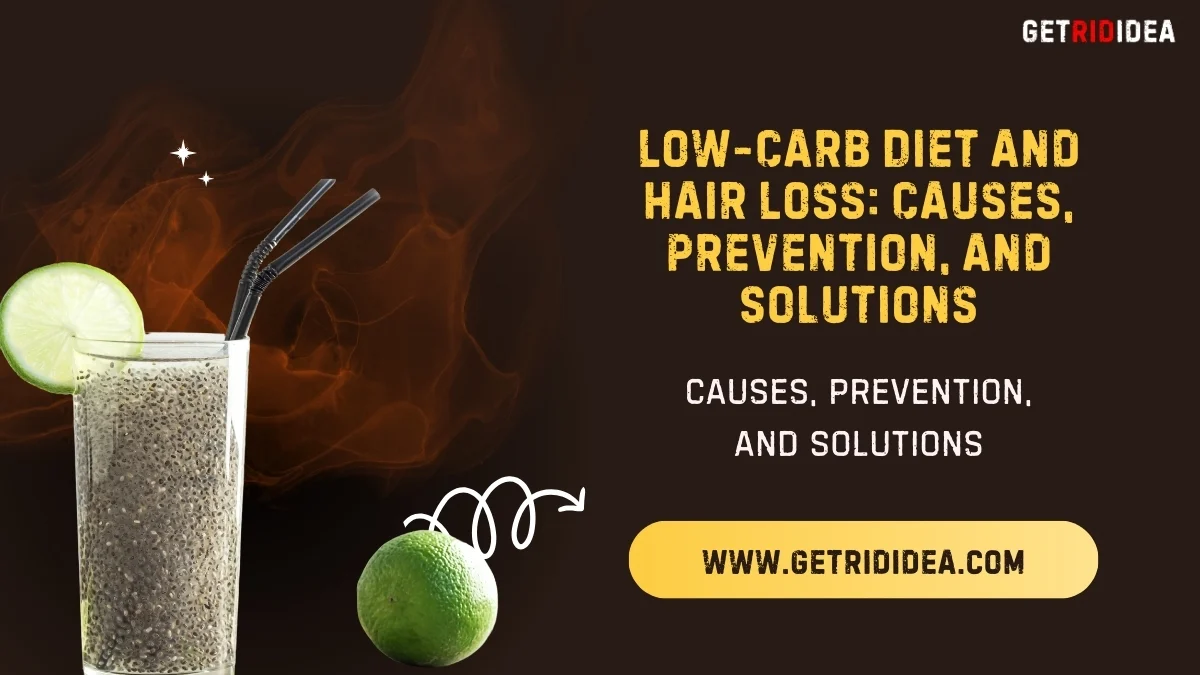A low-carb diet is a popular choice for weight loss and improving metabolic health. Studies from institutions like the Harvard T.H. Chan School of Public Health and the Journal of Nutrition suggest that reducing carbohydrate intake can improve metabolic markers and aid in weight loss. Research suggests that reducing carbohydrate intake can have metabolic benefits, but some people experience hair loss as a side effect (Source: Harvard T.H. Chan School of Public Health). Understanding the underlying reasons can help mitigate this issue. In this article, we explore the link between low-carb diets and hair loss, the causes behind it, and practical solutions to maintain healthy hair.
- 1 How a Low-Carb Diet Affects Hair Growth
- 2 Causes of Hair Loss on a Low-Carb Diet
- 3 How to Prevent Hair Loss While on a Low-Carb Diet
- 4 When to See a Doctor
- 5 Conclusion
- 6 Low-Carb Diet for Athletes: Boost Performance & Improve Recovery
- 7 Low-Carb Diet for Diabetics: The Ultimate Guide to Managing Blood Sugar Naturally
- 8 Low-Carb Diet and Kidney Health: Benefits, Risks, and How to Stay Safe
How a Low-Carb Diet Affects Hair Growth
The hair growth cycle consists of three phases:
- Anagen (Growth Phase): Lasts several years and determines hair length.
- Catagen (Transition Phase): A short phase where hair follicles shrink.
- Telogen (Resting Phase): Hair sheds naturally before regrowth begins.
Diet plays a crucial role in supporting these phases. When you drastically reduce carbohydrate intake, your body undergoes metabolic shifts that can impact hair health. Studies indicate that rapid dietary changes can trigger temporary shedding due to nutrient redistribution (Source: Journal of Clinical Endocrinology & Metabolism).
Causes of Hair Loss on a Low-Carb Diet
Caloric Deficiency
A sudden drop in calorie intake can push hair follicles into the telogen phase, leading to temporary shedding. Rapid weight loss can also trigger telogen effluvium, a condition characterized by excessive hair loss (Source: American Academy of Dermatology).
Nutrient Deficiency
Carbohydrates are not directly responsible for hair growth, but they often come with nutrient-dense foods that support hair health. A low-carb diet may lead to deficiencies in:
- Biotin: Essential for keratin production; deficiency can cause brittle hair (Source: National Institutes of Health – NIH).
- Iron: A key nutrient for oxygen transport to hair follicles.
- Zinc: Supports hair follicle function and repair.
- Protein: A deficiency can weaken hair strands, leading to breakage.
Stress and Hormonal Changes
Switching to a low-carb diet can cause temporary stress on the body, leading to hormonal changes. Cortisol (the stress hormone) may increase, potentially impacting hair growth cycles. A study published in the Journal of Investigative Dermatology suggests that elevated stress hormones contribute to hair thinning.
Reduced Insulin Levels
Carbohydrates influence insulin secretion, which plays a role in hair follicle stimulation. Research from the Journal of Endocrinology suggests that insulin-like growth factors (IGFs) contribute to hair follicle cycling and proliferation, helping maintain healthy hair growth. A sudden drop in insulin levels may slow hair growth temporarily. Research from the Journal of Endocrinology highlights how insulin supports hair follicle activity.
How to Prevent Hair Loss While on a Low-Carb Diet
Ensure Sufficient Nutrient Intake
Incorporate nutrient-dense, low-carb foods such as:
- Protein Sources: Eggs, fish, poultry, and lean meats.
- Healthy Fats: Avocados, nuts, seeds, and olive oil.
- Iron-Rich Foods: Spinach, red meat, and shellfish.
- Zinc-Rich Foods: Pumpkin seeds, almonds, and seafood.
Consider Supplements
If dietary intake is insufficient, supplements can help prevent deficiencies. Key supplements include:
- Biotin (5,000 mcg daily)
- Iron (if blood tests confirm deficiency)
- Zinc (10–15 mg daily)
- Omega-3 fatty acids (for scalp health)
Manage Stress Levels
Stress-induced hair loss can be managed through:
- Adequate sleep (7–9 hours per night)
- Mindfulness practices like meditation and yoga
- Regular exercise to support overall well-being
Gradually Transition to a Low-Carb Diet
Instead of an abrupt carb reduction, taper your intake gradually. This helps your body adapt without unnecessary stress.
Stay Hydrated
Water is crucial for transporting nutrients to hair follicles. Aim for at least 8–10 glasses of water daily.
When to See a Doctor
If hair loss persists beyond 3–6 months despite dietary adjustments, consult a doctor. A healthcare professional, such as a dermatologist or a registered dietitian, can check for underlying conditions such as:
- Thyroid imbalances.
- Severe nutrient deficiencies.
- Autoimmune disorders (e.g., alopecia areata)
Conclusion
A low-carb diet can lead to hair loss due to caloric restriction, nutrient deficiencies, hormonal changes, and stress. However, by maintaining a well-balanced intake of essential vitamins and minerals, staying hydrated, and managing stress levels, you can minimise hair loss while benefiting from the advantages of a low-carb diet. If hair loss persists, seeking professional advice is essential to rule out underlying health issues. Additionally, referring to peer-reviewed research and medical sources can provide further clarity on managing dietary-induced hair loss.

